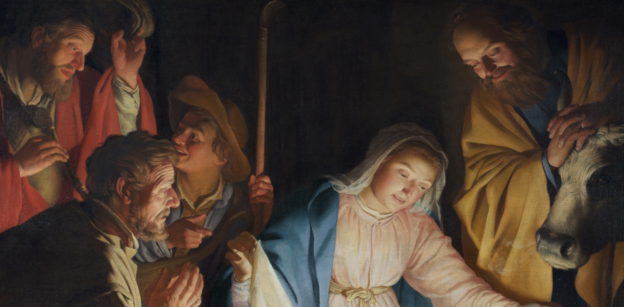The presents start to appear under the tree. The advent calendars have fewer and fewer days yet unopened to reveal their treats. The countdown clock shows fewer and fewer sleeps until the big day. The time is drawing near for Christmas Day. The time when the signs that point forward to the big day are fulfilled.
When God promises, God acts. The deed follows the word which announces it. As Christmas quickly approaches, we remember again God’s fulfilment of the many promises he made about the coming of Jesus, the promised son. Just as Isaac’s birth fulfilled the promise made to Abraham and Sarah, so too the birth of Jesus is God’s fulfilment of his words of promise. The same words of announcement that promise salvation from our sins for all who believe.
Abraham and Sarah were as old as the hills, and God’s announcement of a son born to them both brought laughter on two separate occasions to each of them in turn. Neither could believe their ears. But God would act on his own initiative, not in response to theirs.
After the destruction of Sodom and Gomorrah for their sin, and another episode of weakness and doubt on Abraham’s part (yet both involving God protecting his people), the time for fulfilment finally arrived.
“The LORD visited Sarah as he had said, and the LORD did to Sarah as he had promised” (v.1). Where before Sarah had only known and come to expect the sadness of childlessness, God visited Sarah long after the usual years for giving birth to change the tune.
Following this miraculous event, Sarah conceived and bore a son to Abraham (v.2). Just as God had promised, a year later he returned and gave Abraham and Sarah the promised son who would inherit the promises made to and received by Abraham, so many years before.
Abraham, who was faithful to the covenant God made with him, responded with faith and obedience. He named his son Isaac, fulfilling God’s command (v.3, cf. 17:19). He circumcised Isaac, giving him the covenant sign and seal, fulfilling God’s command (v.4, cf. 17:9-12).
Isaac means “he laughs”. Isaac’s name was a forever memory of the disbelief both showed when God announced his plans, but also the joy they felt at the birth of the baby boy who fulfilled the promise.
After all, it truly was a miracle. Abraham was 100 years old (v.5), and Sarah herself was ninety. Moreover, Sarah had borne the pain of being unable to bear children until now, yet she had borne Abraham a son in old age (v.7).
Sarah herself recognised that the joy was not just for her and Abraham, but for others who would one day benefit from God’s acts. “God has made laughter for me; everyone who hears will laugh over me” (v.6). This was not the laughter of mockery, “of course God would fulfil his promises!” but of shared joy. The child was the fulfilment of a promise, a promised son, but also the inheritor of the promise to Abraham that “in you all the families of the earth shall be blessed” (Gen 12:3).
However, this was not the climax of the story for Abraham and Sarah. Genesis does not immediately jump forward to Isaac’s adult life and marriage. Isaac had to grow through adversity (Gen 21:8-21).
But more than the mocking laughter of an older half-brother (and probably the rest), Isaac was the “object” of a test of Abraham’s faith. Isaac was the promised son, but he was not the sacrifice for sin. A ram had to be provided as a substitute (Gen. 22:13). God would provide that substitute, just as he provided a substitute animal instead of Isaac, Abraham’s only son of the promise (Gen. 22:14).
Which brings us to Jesus. The far-off promised son, born as promised (Isaiah 7:14) of a virgin (Matt. 1:22-25). The promised son who would fulfil the promise to bless all the nations, “for he will save his people from their sins” (Matt. 1:21). A son who also grew up facing adversity. Yet who did so without sin.
Unlike Isaac, Jesus’ life was not spared on the day of sacrifice. God did indeed provide a substitute, but not for Jesus. Jesus was the substitute sacrifice for us. Born to die. Born to bear the penalty for our sins, on our behalf, so we can live in renewed and restored fellowship with God. Not just now, but for all time.
The promise God made in the Garden of Eden, and again and again throughout history, of the snake crusher who would deal to the problem of sin. Who would fulfil the Covenant of Grace, proclaimed in the Garden, to Abraham, and to others throughout history.
Christmas is a reminder that God fulfils his promises. God’s words announced. God acted. He sent his son to take on true human flesh, exactly like us. But unlike us, to live perfectly and die for us. And be the eternal reigning king.
Merry Christmas.

